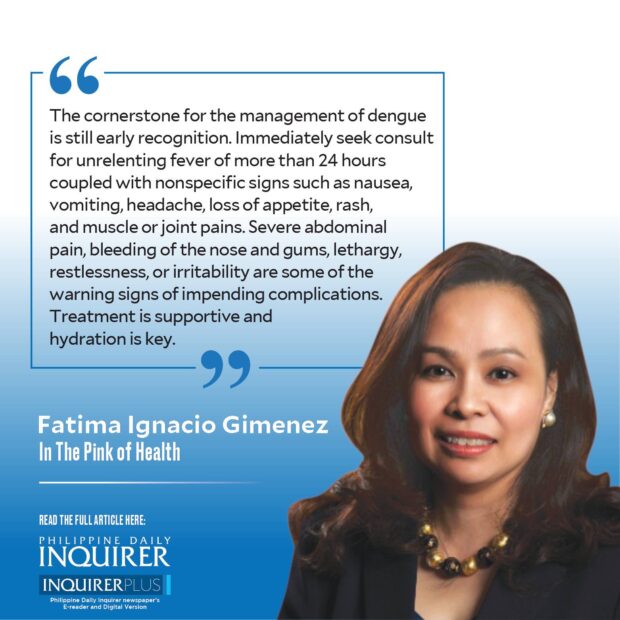Slay to rest

Is it possible to achieve zero dengue deaths?” This was the question posed to a panel of experts at the end of the three-day Asia Dengue Summit. Spearheaded by the Asia Dengue Voice and Action group (ADVA), this annual conference is a venue wherein various stakeholders from the scientific community, researchers, partners in the industry, policymakers, health officials, clinicians, and public health advocates gather to share knowledge and engage in discussions on creating actionable solutions to address the problem of dengue.
“Ambitious, at least by 2030,” this was a bold statement made by one of the speakers to the sustainable development goal set by the World Health Organization. Exhausted from the information overload in the past days, I sat up straight and lent both ears. It was refreshing to hear someone echoing the honest truth and she probably spoke for the majority. While it was comforting to know that progress is being made through advances in therapeutic management and diagnostic modalities, enhanced surveillance activities, better access, and the promise of new generation dengue vaccines, ongoing vector control with the use of Wolbachia, a bacteria that affects mosquito reproductivity and block virus transmission, we were all well aware that it was close to an impossibility given the time frame.
While the truth does hurt, this is the reality. To this day many factors impact on dengue control, foremost, a thorough understanding of the virus and the vectors, climate change, human behavior, poverty, lack of leadership, and the political will to seriously effect change. All these contribute to its persistence and these concerns are universal.
Article continues after this advertisementSitting in the huge ballroom while listening to our neighboring countries present promising data and research, success stories from their government, and philanthropic initiatives, I had nagging thoughts of having lost on opportunities that could have propelled us to be in a better position. Running through a mental checklist, there is neither a lack of expertise nor an absence of committed and dedicated individuals. From experience and exposure, we are capable of keeping in step with other countries in the region.
So what are the missing ingredients? Allow me to share some personal takeaways from the summit.
First, recognizing the lack of funding for research and innovative strategies, we should probably triple our efforts in seeking and utilizing available cross-border collaborations that have enabled other countries to progress. We should also learn to be comfortable in showcasing our achievements rather than settle for being at the sidelines thinking that our work can eloquently speak for itself. Not everyone knows of you or has heard about the work that you do. We need to be more adept at networking with those who are at the forefront so that they are aware that we exist. In every conference, whether local or international, to see a Filipino take the stage and share knowledge is a constant source of pride. We have what it takes and should magnify our strengths rather than wallow in the weaknesses both real or perceived, or worse be accepting of things that seemingly cannot be changed. We have a strong scientific community and should work at being top of mind as potential partners and powerful allies.
Article continues after this advertisementSecond, we should push for more government, public, and private support as the others have done, investing in people and embracing new technology that may offer long-term and sustainable solutions rather than resorting to quick-fix tools. There is a need to improve and strengthen surveillance activities way beyond passive reporting, prioritize vector control and community engagement, and proactively correct misinformation and disinformation, particularly on the role of vaccines as being part of the armament to address dengue. To regain the public’s trust and confidence not only in the government, the medical community, and other concerned agencies, there is a need for clarity and transparency. We are badly in need of someone who can drive the creation of policies that could convince persons of influence that these measures may be a potential blueprint for helping control dengue and possibly, other vector-borne diseases.
Third, multiple stakeholders should interlink and synchronize efforts to send one unified message. Dengue is endemic, a substantial cause of morbidity and mortality, impacts the economy, and potentially could drain health resources. Everyone in their lifetime is vulnerable and can experience reinfection as there are four dengue serotypes.
The cornerstone for the management of dengue is still early recognition. Immediately seek consult for unrelenting fever of more than 24 hours coupled with nonspecific signs such as nausea, vomiting, headache, loss of appetite, rash, and muscle or joint pains. Severe abdominal pain, bleeding of the nose and gums, lethargy, restlessness, or irritability are some of the warning signs of impending complications. Treatment is supportive and hydration is key. Report clustering of cases in your community and keep your surroundings free from being potential breeding sites.
Remember, it only takes one bite from an infected female mosquito to get the virus. It’s about time we make dengue a top health priority.
timgim_67@yahoo.com
















